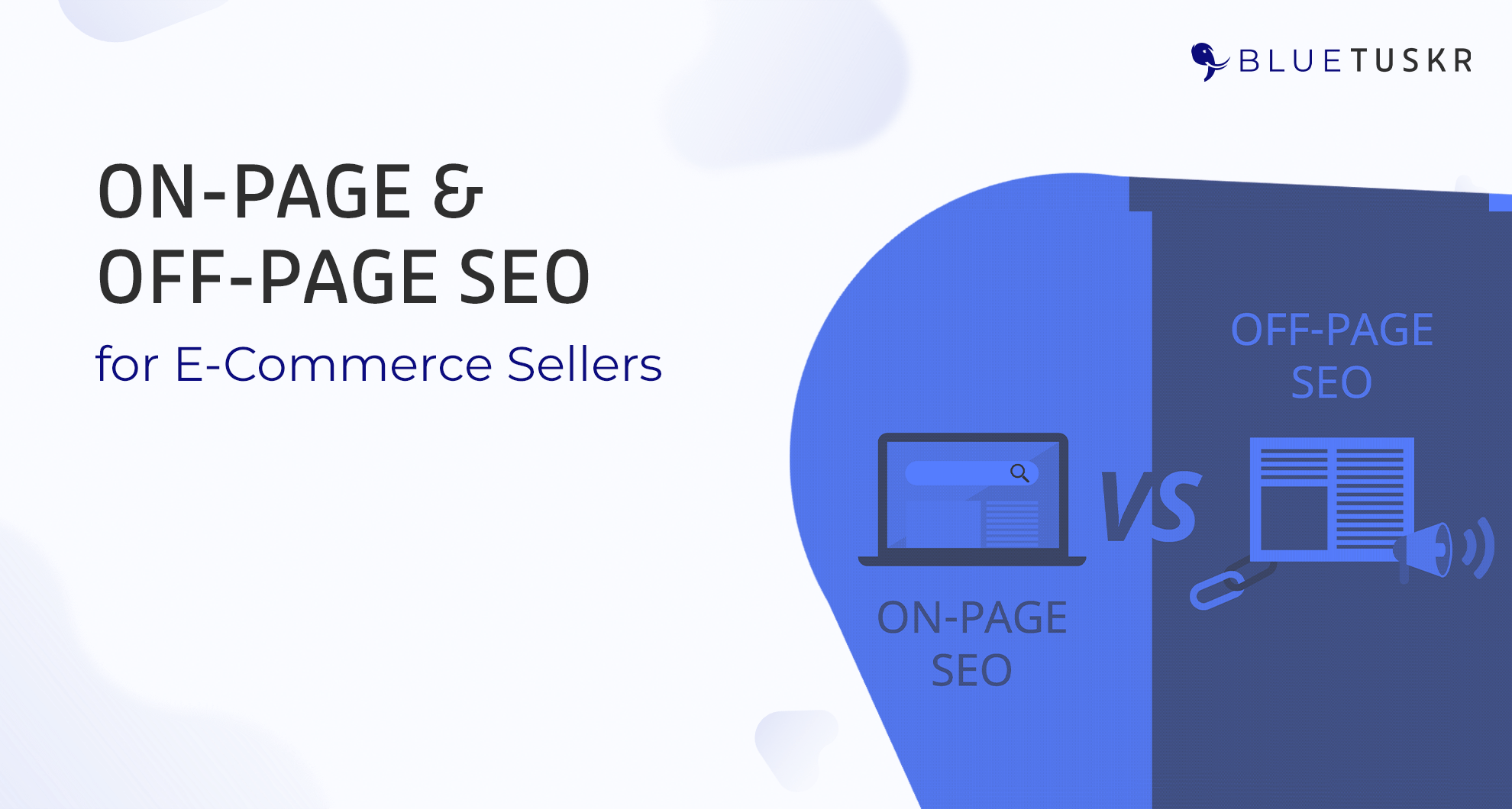
Understanding On-Page and Off-Page E-commerce SEO
Ever wonder why your stunning e-commerce site isn’t getting the love it deserves on Google? Whether you’re a seasoned digital marketer or an ecommerce SEO newbie for an ecommerce business, understanding the nuts and bolts of an ecommerce SEO strategy, including link building, keyword research, and monitoring technical SEO issues, is crucial for your online success.
In this blog post, we’ll break down the essentials of on-page and off-page SEO, sharing insider tips and tricks to get your store ranking where it belongs. Ready to transform your SEO game? Grab your coffee and keep reading!
The Importance of On-Page SEO
On-page SEO (search engine optimization) is like arranging your store in a way that makes it easy for customers to find what they need. It’s all about meta tags, URL structure, and product descriptions.
Meta Tags
What are Meta Tags?
Meta tags are snippets of text that provide information about your website to search engines. They appear in the HTML code but are not visible on the actual webpage. These include title tags, meta descriptions, and header tags.
Why are They Important?
Meta tags play a crucial role in helping search engines understand the content and context of ecommerce sites. This allows them to accurately rank your site for relevant keywords and phrases.
Bluetuskr Tips
-
Keep titles under 60 characters and descriptions under 160 characters to ensure they don’t get cut off in search results.
-
Use target keywords naturally within your title tag and description.
-
Write compelling, click-worthy titles and descriptions to entice users to click through to your ecommerce site.

URL Structure
What is a URL Structure?
URL structure refers to the way your website links are organized and displayed. A well-structured URL should be easy to read and contain relevant keywords (psst... before anything consider ecommerce keyword research to ensure you're targeting the right keywords. For keyword ideas and tips and tricks, check out our article here.)
Why is it Important?
A clear and concise URL structure not only helps search engines understand the content of your page but also makes it easier for users to navigate through your site.
Bluetuskr Tips
-
Use hyphens (-) instead of underscores (_) between words in your URLs.
-
Keep URLs as short and simple as possible, avoiding unnecessary characters or numbers.
-
Include target keywords in your URLs, but avoid keyword stuffing.
Product Descriptions
Why are Product Descriptions Important for SEO?
Product descriptions play a significant role in SEO as they provide valuable information about your products to search engines and potential customers. Well-written descriptions can also help improve the user experience, leading to higher conversion rates.
Bluetuskr Tips
-
Use target keywords naturally within product descriptions.
-
Write unique and compelling descriptions for each product to avoid duplicate content issues.
-
Incorporate relevant details, such as size, color, material, etc., in product descriptions.
Best Practices and Tools for On-Page SEO
On-page SEO isn’t just about knowing what to do – it’s also about doing it right. And for that, you need the right tools and practices.
-
Content is King: Update your content regularly. Add blogs, guides, and more product details to keep your site fresh.
-
Use SEO Tools: Tools like Yoast SEO for WordPress or Moz can help you optimize your on-page elements effectively.
-
Internal Linking: Link to related products and blog posts within your site. It improves navigation and keeps visitors engaged longer.
-
Internal Links: Emphasize the importance of internal linking for SEO. It boosts ranking strength, guides users through the website, and passes authority from one page to another. Use relevant anchor text and ensure links fit naturally within your site’s navigation and structure.
The Power of Off-Page SEO
Off-page SEO is like promoting your store to the world. It involves activities that take place outside of your website but still have a significant impact on your rankings.
Link Building
What is Link Building?
Link building is the process of acquiring backlinks from other ecommerce websites to your own. These links act as “votes” for your site, telling search engines that others find your content valuable and trustworthy.
Why is it Important?
Backlinks are a crucial ranking factor for search engines. The more high-quality backlinks you have, the higher your site will rank.
Bluetuskr Tips
-
Focus on quality over quantity when it comes to link building.
-
Reach out to relevant industry blogs and websites asking for backlinks.
-
Create shareable, valuable content that naturally attracts backlinks.
Social Media
What is the Role of Social Media in SEO?
Social media plays an essential role in off-page SEO by increasing brand awareness, driving traffic to your site, and creating opportunities for backlinks.
Why is it Important?
Google and other search engines consider social media activity a sign of credibility and popularity, which can positively impact your rankings.
Bluetuskr Tips
-
Create engaging content that users will want to share on their social media channels.
-
Use relevant hashtags and keywords in your posts to increase visibility.
-
Interact with your audience by responding to comments, liking, and sharing their content.
Best Practices and Tools for Off-Page SEO
Off-page SEO requires ongoing effort and monitoring to be effective. Use these tips and tools to boost your off-page efforts.
-
Monitor Your Brand Mentions: Keep track of how your brand is being mentioned online using tools like Google Alerts or Mention.
-
Utilize Social Media Management Tools: Platforms like Hootsuite or Buffer can help you schedule posts, analyze performance, and manage multiple social media accounts in one place.
-
Build Relationships with Influencers: Collaborate with influencers in your industry by offering them free products or services in exchange for mentions or reviews on their channels.
-
Aim for Top Organic Search Engine Results: Appearing among the top organic search engine results on the first page of search engines like Google is crucial for driving traffic and sales for ecommerce stores.

The Role of Technical SEO in E-commerce
We couldn't write an article about SEO without mentioning technical SEO, as it's the foundation of a well-optimized ecommerce website. Here are some important technical elements to consider for your e-commerce site:
Site Speed and Mobile-Friendliness
Technical SEO is the backbone of your e-commerce site. If your site is slow or not mobile-friendly, you’re losing customers before they even see your products.
Speed Up Your Site
-
Use a reliable hosting service. Invest in a good one; it’s worth it.
-
Compress images and use a content delivery network (CDN).
-
Minimize HTTP requests and enable browser caching.
Mobile Optimization
-
Use responsive design. Your site should look great on any device.
-
Simplify navigation. Make it easy for mobile users to find what they need.
-
Increase touchpoint size. Make buttons and links large enough to tap easily.
Structured Data and Rich Snippets
Structured data helps search engines understand your content better, leading to enhanced visibility. Rich snippets, on the other hand, provide additional information about your products in search results, making them more attractive to potential customers.
How to Use Structured Data and Rich Snippets
-
Add structured data markup using Schema.org vocabulary.
-
Test your structured data using Google’s Structured Data Testing Tool.
-
Utilize product schema for e-commerce sites, including price, availability, reviews, etc.
SSL Encryption
SSL encryption adds an extra layer of security to your website and is a ranking factor for Google. Plus, it helps build trust with potential customers who may be hesitant about entering their personal information on your site.
How to Get SSL Encryption for Your Site
Check with your hosting provider, as many offer free or affordable SSL certificates. If not, there are third-party services, such as Let’s Encrypt, that offer free SSL certificates.
Ecommerce SEO Tools for Auditing
Conducting regular SEO audits is crucial for maintaining a well-optimized e-commerce site. These tools can help you identify and fix any technical issues that may be hindering your rankings.
-
Google Search Console: This free tool from Google provides insights on how your site is performing in search results, including indexing status, crawl errors, and more.
-
Screaming Frog: This tool crawls your website to identify technical issues like broken links, duplicate content, and missing metadata.
-
SEMrush: With SEMrush, you can conduct a comprehensive audit of your e-commerce site's SEO performance, including backlinks analysis and keyword research.

The Power of Working with SEO Experts
While it's possible to handle SEO on your own, working with experts can greatly improve your results. They have the knowledge and experience to optimize your site effectively and keep up with constantly changing algorithms.
Benefits of Working with an SEO Agency:
-
Strategic planning: SEO experts can develop a customized strategy for your e-commerce site to target the right keywords and improve your rankings.
-
Time-saving: By delegating SEO tasks to professionals, you have more time to focus on other aspects of your business.
-
Access to advanced tools and techniques: SEO agencies have access to top-of-the-line tools and techniques that may not be available or affordable for individual businesses.
-
Bluetuskr is a full-service digital marketing agency with expertise in SEO for e-commerce sites. Our team of experts can help you improve your online visibility, drive more traffic to your site, and ultimately increase conversions and sales.
The Future of E-commerce SEO
Adapting to Algorithm Updates
Google loves to keep us on our toes with frequent updates. Staying ahead is key.
Stay Informed
-
Follow SEO news sites like Search Engine Journal, Moz Blog, and, of course, our own Bluetuskr blog.
-
Join SEO communities to learn from industry experts.
Adapt Quickly
-
Monitor your site’s performance regularly.
-
Be ready to make necessary changes promptly.
Integrating Voice Search and AI
Voice search and AI are transforming how people find information online. Here’s how to prepare.
Optimize for Voice Search
-
Use natural language keywords. People speak differently than they type.
-
Focus on long-tail keywords and question phrases.
Leverage AI Tools
-
Use AI-powered SEO tools like Clearscope to optimize your content.
-
Implement chatbots for better customer engagement.
Conclusion
E-commerce SEO is like brewing the perfect cup of coffee – it takes time, effort, and the right ingredients. By mastering on-page and off-page strategies, you can improve your site’s visibility, attract more customers, and ultimately boost sales.
Why not take the next step and transform your e-commerce business? Start implementing these tips today and watch your rankings soar! If you’re ready for expert help, our team is here to guide you to SEO success. Start your journey at Bluetuskr, an e-commerce marketing agency!
Connect With Us
Recent Post

.png)








Tell us what you think!